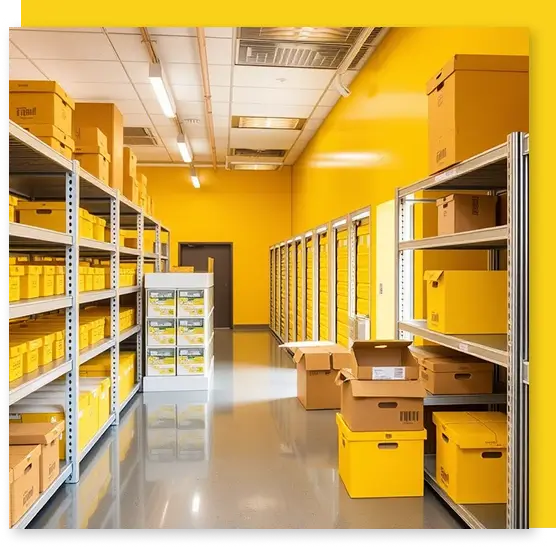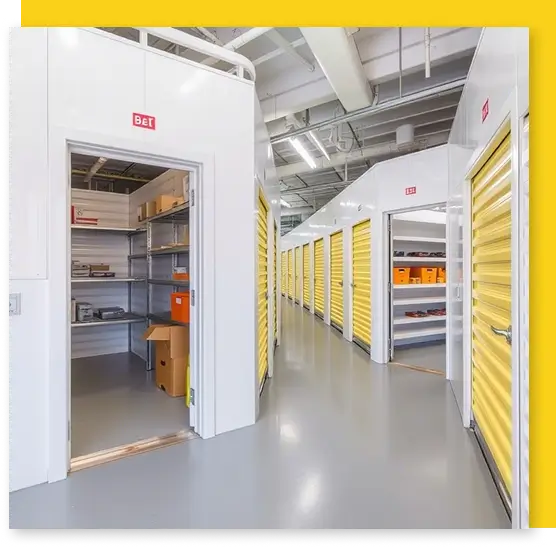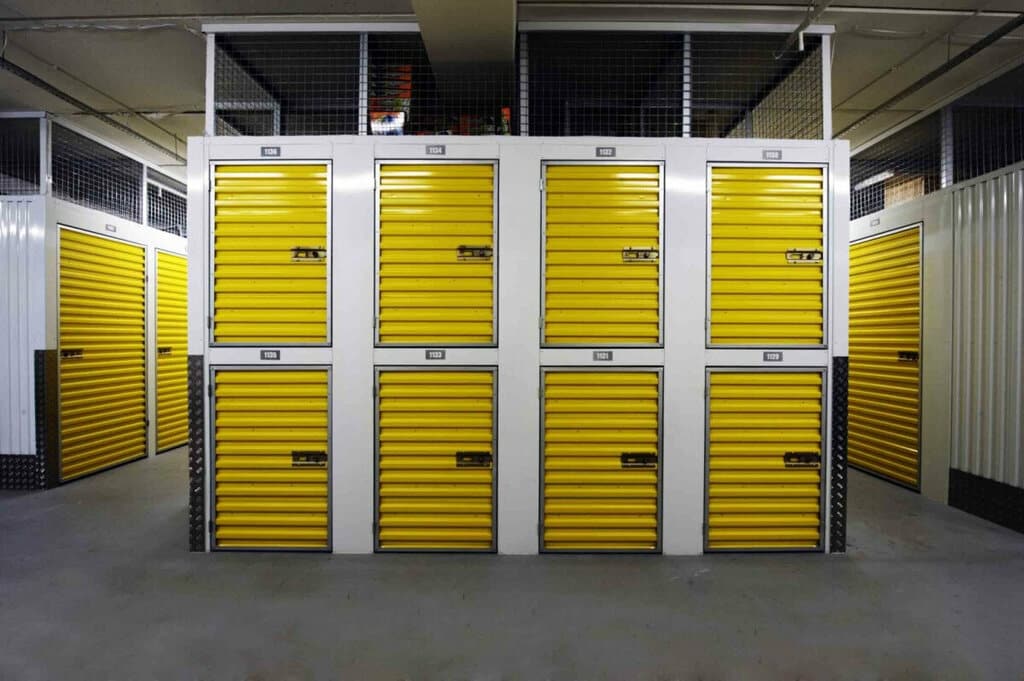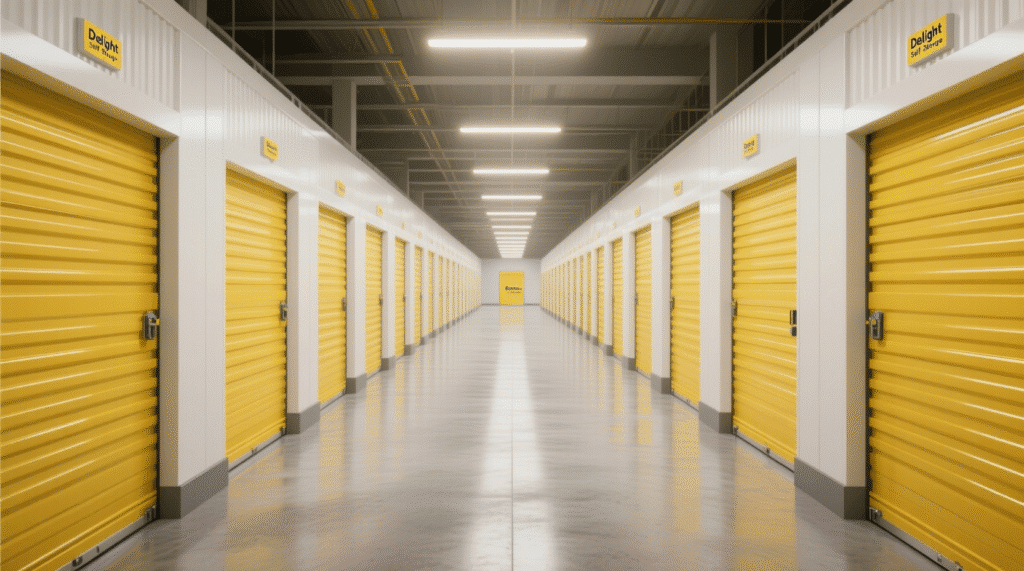Self-storage demand is climbing across the Emirates, driven by a fast-growing expat population, e-commerce logistics, and rising rents. Typical personal units range from AED 300–375/month for lockers to AED 900–1,400/month for a 50 sq ft room; box storage pickup services start near AED 95/month for a few cartons—plus 5% VAT. Climate control matters because summer heat and humidity can warp furniture and electronics. Hazardous items are restricted under the UAE Fire & Life Safety Code and other laws. Always check notice periods, deposits, and cancellation rules before you book.
Table of Contents
Why self storage in the UAE is surging
- Population and mobility are high: In 2025, Dubai is the most populous emirate in the UAE, with an estimated 3.95 million residents. Expat communities comprise the large majority, driving frequent moves, upsizing/downsizing, and temporary storage needs.
- Rents remain elevated (with pockets of stability): In H1-2025, Bayut tracked broad rent increases across many areas of Dubai and Abu Dhabi (generally single-digit to low-double-digit, depending on community and bed type), which pushes residents to optimize space rather than upgrade to bigger homes.
- E-commerce + SME growth: The UAE E-Commerce Market is expected to reach USD 11.05 billion in 2025 and grow at a CAGR of 12.39% to reach USD 20.54 billion by 2030, and the UAE self-storage market itself is projected to grow from about USD 602.5M (2024) to USD 859.2M (2030)—demand that reflects both household and business use.
What this means for you: If you’re a UAE resident facing rising rents, periodic relocations, or running a small online business, self storage UAE is a flexible way to keep life uncluttered without paying for a larger lease.
Storage Solutions Across the Emirates: Finding the Right Fit for You

Traditional self-storage units
From compact box storage to spacious warehouse facilities, the Emirates offers tailored solutions for every lifestyle and business need. Whether you’re moving, decluttering, or expanding your company, the right storage format ensures convenience, security, and value.
What they are: Private, lockable rooms sized from a locker (~12–20 sq ft) up to 120+ sq ft and beyond. Facilities typically advertise CCTV, access control, and many offer climate-controlled buildings—useful for UAE summers.
Who they suit: Movers between leases, residents downsizing, long-term expats protecting furniture/documents, hobbyists (e.g., bikes, golf sets), and families storing seasonal items.
“Box storage” (pick-up & store by the box)
What it is: The operator sends boxes, collects them, stores them securely, and redelivers on request. You pay per box or per item; ideal when you don’t need a full room.
Who it suits: Students, frequent flyers, decluttering projects, and anyone without a car/van.
Public pricing examples:
- Crown Relocations – Store-By-The-Box: Starts at AED 95/month + VAT for up to three boxes (minimum charge applies).
- BOXIT (UAE): Marketing shows ~AED 150/month “average” for items/box-level plans (pickup/delivery extra).
Reality check: Pickup/delivery, repacking, or special handling are usually add-ons. Always request a full, written breakdown.
SME & e-commerce overflow
What it is: Mini-warehouse rooms or large units with loading docks; some facilities accept receiving on your behalf.
Who it suits: SMEs needing overflow inventory space, micro-fulfilment, or seasonal stock.
Accounting & VAT
Standard VAT in the UAE is 5%; registered businesses should obtain VAT invoices. Movements in and out of Designated Zones (e.g., free zones) can have specific VAT treatments—speak to your tax adviser and consult FTA/MoF resources.
Typical Monthly Prices in Dubai (Self-Storage Units)

Based on recent data, here are the common sizes and their respective price ranges:
- Lockers (~20 sq ft): AED 275–300/m (Smart Box Storage list prices vary by branch).
- 50 sq ft: AED 575/m (Al Quoz) to 475/m (DIP) at one provider; market-wide guides commonly show AED 900–1,400/m for 50 sq ft in Dubai/Abu Dhabi.
- 100–120 sq ft: Often AED 1,150–2,800/m depending on city, floor, and promo.
- 25 sq ft unit (1–1.2 m³, ideal for 6 boxes): ~AED 300–400/month.
- 50 sq ft unit (9–16 m³, for a studio apartment): ~AED 900–1,400/month.
- 75 sq ft unit (15–18 m³, 1-bed furniture): ~AED 1,000–1,450/month.
- 100 sq ft unit (20–30 m³, 2-bed home): ~AED 1,000–2,000/month.
- 120 sq ft unit (40–50 m³, 3-bed content): ~AED 1,500–2,800/month.
- 160 sq ft unit (90–100 m³, 4-bed or medium office): upwards of AED 3,000/month.
Good to know: Some providers charge different rates between Al Quoz and DIP branches (central vs more peripheral).
How much does a storage unit cost in the UAE?
Below are publicly posted or guide-level examples; your quote will vary by location (Al Quoz vs DIP vs Mussafah), access hours, floor level, promotions, and climate control.
Format / Size | What fits (rule-of-thumb) | Typical monthly examples |
|---|---|---|
Locker (15–20 sq ft) | 6–8 medium boxes, luggage, documents | AED 275–300 at some Dubai sites (locker/20 sq ft); guides show AED 250–375 common. |
25–30 sq ft | 6–10 boxes + stroller/golf bags | AED 300–400 (Abu Dhabi/Dubai guides). |
50 sq ft (studio contents) | Bed, sofa, white goods, ~14 boxes | AED 575 (DIP)–575+ (Al Quoz) at one brand; market guides: AED 900–1,400. |
75–100 sq ft | 1–2 BR home (lightly furnished) | AED 1,000–2,000 typical in guides; provider pages list ~AED 1,150/m (100 sq ft) baseline before promos. |
| 120 sq ft+ | 2–3 BR contents | AED 1,500–2,800+ (guide ranges). |
Box storage | Per box/item | AED 95/m + VAT (up to 3 boxes); other services show ~AED 150/m averages. |
Don’t forget VAT and extras: UAE’s standard VAT rate is 5% and is typically added to storage invoices. Factor in padlocks/insurance, pickup/delivery (box storage), out-of-hours access, and any admin/deposit in your total cost.
Climate control is not a luxury—here’s the data
Why it matters in the UAE: Extended periods of heat + humidity increase the risk of warping (wood/leather), mold, paper deterioration, and electronic corrosion. The World Bank Climate Change Knowledge Portal highlights compounded heat/humidity risks for the UAE and provides historical and projected heat-humidity indicators.
Bottom line for residents: If you are storing furniture, documents, artwork, musical instruments, or tech—especially May–October—prioritize climate-controlled rooms and ask the operator for their temperature/humidity bands (e.g., 20–25 °C, RH < 60%).
What You Can’t Store (and Why)

While self-storage units in the UAE offer safe, private space for personal and business items, there are strict rules on what you cannot keep inside. These restrictions exist to protect you, other customers, and the facility itself.
Regulatory Framework
- Dubai Civil Defence (DCD): Oversees fire safety, hazardous control approvals, and conducts inspections of licensed hazardous-materials warehouses.
- Ministry of Interior (MOI): Provides e-services for approvals related to hazardous material warehouses, chemical tanks, and permits for controlled substances.
- Federal Law No. 24 of 1999 (Environment): Prohibits handling, storing, or disposing of hazardous substances or waste without licenses from competent authorities. Violations may result in fines, closure orders, and even criminal penalties.
Practical Rule for Standard Units
For everyday customers using traditional self-storage units, the following are strictly prohibited:
- Flammable or combustible goods – e.g., fuel canisters, petrol, diesel, kerosene, fireworks, or explosives.
- Pressurized or hazardous cylinders – oxygen, propane, or other compressed gases.
- Toxic or corrosive chemicals – paint thinners, solvents, acids, or pesticides.
- Perishable items – fresh food, frozen goods, or anything that can spoil and attract pests.
- Living organisms – live animals, plants, or any biological material requiring special care.
- Illegal or controlled goods – unlicensed pharmaceuticals, weapons, counterfeit products, or anything banned under UAE law.
Why These Rules Exist
- Fire & Safety Risks: Hazardous substances can ignite, leak, or cause explosions in enclosed spaces.
- Health Concerns: Perishables or chemicals may release fumes, attract pests, or contaminate the facility.
- Legal Compliance: Storing restricted goods without proper licensing violates UAE federal law and local civil defence regulations.
- Insurance Coverage: Most self-storage contracts void coverage if prohibited items are found.
Professional Tip: If you are unsure about an item, ask the facility for its DCD-aligned prohibited list before moving in. For companies needing to store controlled substances, a specialized hazardous-materials warehouse with MOI/DCD approval is required.
City Snapshots: Where Residents Feel the Pinch
Across the Emirates, storage demand isn’t just about finding space—traffic realities, rent trends, and lifestyle shifts shape it. Here’s how these pressures play out city by city.
City/Emirate | Main Pinch Point | Resulting Storage Trend |
|---|---|---|
| Dubai | Heavy traffic (avg. 18m/10km), rent churn (up to 9% hikes in budget areas) | Demand for close-to-home storage; short-term units during move-outs/renewals |
Abu Dhabi | Rising rents (2%–21% for apartments, up to 13% for villas) | Families & villa owners use temporary storage during relocations/renovations |
Sharjah | Budget housing squeeze; commuter traffic into Dubai | Small units & box storage for students and families seeking affordable solutions |
Ajman | Smaller apartments despite lower rents | Furniture & seasonal storage; flexible short-term use for mobile expats |
Ras Al Khaimah | SME and expat inflow; affordable unit rates (~AED 400/54 sq ft) | Growing demand for mini-warehouses and climate-controlled storage |
| Fujairah | Logistics and port-driven trade | Business-heavy demand for warehouse space, plus rising household storage use |
Al Ain | Student relocations, family expansions | Box storage for students; larger units for families during renovations |
Bottom Line: Each Emirate has its own storage pressures—traffic in Dubai, rising rents in Abu Dhabi, small apartments in Ajman, SME growth in RAK, logistics in Fujairah, and family/student cycles in Al Ain. The strongest facilities are those that tailor solutions to local pain points rather than applying a one-size-fits-all model.
The hidden costs & the fine print (read this before you sign)
VAT & business use: Storage invoices generally attract 5% VAT (standard rate) under UAE VAT Law; registered entities need valid VAT invoices. (Mandatory VAT registration threshold: AED 375,000 taxable supplies; voluntary registration at AED 187,500.) If you operate in a Designated Zone, ask your adviser about movements and place-of-supply rules.
Notice periods & cancellations: Policies vary—examples on UAE provider T&Cs include short cancellation windows, no mid-cycle pro-ratas, and one-month minimum terms. Read the contract before paying.
Deposits & admin fees: Many facilities require a refundable deposit and may charge admin/lock fees; always request an itemized, VAT-inclusive quote. (Check your chosen operator’s T&Cs.)
Insurance: Some operators offer optional contents cover; many renters prefer third-party international personal property insurance. Note: some policies exclude items in self/public storage unless you add the appropriate rider—read the coverage chart carefully.
UAE-specific challenges—and how to solve them before you book
Heat & humidity risk
Challenge: UAE summers bring high temperatures and notable humidity. That combination warps wood, ruins paper/photos, and invites mold.
What to do:
- Prioritize climate-controlled storage in the UAE for furniture, electronics, artwork, leather, instruments, and documents.
- Ask for dehumidification specs and temperature range (ideally ~20–24 °C, stable RH).
- Pack in breathable materials; avoid plastic wraps for wood/leather.
Why it matters: NCM guidance and UAE weather reports regularly note summer mean RH in the ~47–72% range—enough to damage sensitive items without climate control.
Hidden fees (and VAT)
Advertised monthly rates can omit fees for insurance, locks, admin, late payments, and don’t forget VAT is 5% federally. Factor this into your all-in comparison. (VAT is set at 5% nationwide since 2018, per the Ministry of Finance and the official portal.)
Resident checklist:
- Request an itemized quote (base rent + VAT + insurance + lock + any admin).
- Ask about renewal caps and prepay discounts (quarterly/annual).
- Confirm grace periods for late payments.
Access vs. traffic reality
Cheap units that cost you hours to reach aren’t cheap. TomTom’s index/rankings illustrate how peak-time travel drags out even short distances. Arrange storage near your daily route (home ↔ work ↔ schools).
Resident checklist:
- Prioritize 24/7 access or late-evening hours; ask about parking bays, trolleys, and lift capacity.
- If commuting from Sharjah/Ajman into Dubai, pick a facility close to E11/E311 interchanges to cut time.
Contracts that don’t match your life
Many UAE tenancies renew annually; storage needs don’t always. You want monthly rolling terms, transparent exit clauses, and—if you’re moving—box storage UAE with pickup/drop-off so you’re not making repeat car trips. (Multiple providers in Dubai and Abu Dhabi now advertise box pickup and retrieval.)
What Size Do You Actually Need?
Choosing the right storage size can save you both money and hassle. Renting a space that is too small means frustration, while going too big means paying for square footage you don’t use. Here’s a practical breakdown of typical storage sizes in the UAE, what fits inside, and their average price ranges:
| Size | What They Are | What Fits | Cost (AED/month) | Best For |
|---|---|---|---|---|
Lockers (12–20 sq ft) | Perfect for tucking away life’s smaller extras. | Seasonal clothes, paperwork, collectibles, 6–8 medium boxes. | 250–375 | Students, travelers, declutter projects |
25–30 sq ft units | A step up from lockers, with space for daily-use items. | 6–10 boxes, stroller, golf bags, and small equipment. | 300–400 | Couples, young professionals, sports enthusiasts |
50 sq ft units (Studio) | Designed to hold the essentials of a studio flat. | Bed, sofa, appliances, ~14 boxes. | 900–1,400 | Singles or couples moving/renovating |
75–120 sq ft units (1–3 BR homes) | Spacious enough for an entire household in transition. | Furniture and contents of a 1–3 bedroom home. | 1,000–2,800 | Families relocating or renovating |
Quick Tip: Avoid Over-Renting
If you’re unsure which size is right, always check a capacity guide showing how many boxes or furniture sets fit into each unit type. Most providers (like ServiceMarket and Smart Box Storage) publish these to help you make an informed choice. When in doubt, start smaller—you can often upgrade if needed.
Step-by-Step Booking Checklist (UAE-Specific)
Renting a storage unit in the Emirates is simple—but to avoid hidden costs, wasted time, or damaged goods, it’s worth following a structured process. Here’s a UAE-focused checklist to guide you through:
List Your Items
- Write down everything you’ll store.
- Flag sensitive goods (wood, leather, electronics, artwork).
- Choose climate-controlled units for heat & humidity protection.
Shortlist Facilities
- Pick 3 options within 15–20 minutes of home/work.
- Use Dubai’s 18:03 min per 10 km traffic benchmark as a guide.
Get Written Quotes
Request itemized costs:
- Base rent + VAT
- Deposit & insurance
- Pickup/delivery fees (for box storage)
- Late-hour & admin/lock fees
Review T&Cs
Check for:
- Notice period
- Refund & late fee rules
- Auto-renewal terms
- Prohibited goods list
Prepare KYC + Payment
- Emirates ID + payment method ready.
- Confirm online payment/direct debit options.
6. Move-In Prep
- Buy cartons & tape locally (e.g., 40×40×40 cm boxes ~AED 21 each in 5-pack).
- Label by room/category.
- Keep a simple phone inventory with notes or photos.
Pro Tip: Many UAE facilities sell packing materials, but sourcing boxes from local retail can be cheaper. Always compare prices before moving day.
Conclusion: Making Storage Work for You in the UAE
Self storage in the UAE has evolved into more than just a place to keep extra belongings—it is a flexible solution for households, expats, students, and businesses navigating the region’s dynamic lifestyle. With rising rents, high mobility, and booming e-commerce, demand is only set to grow.
Before booking, remember three essentials:
- Choose the right format and size: Whether a compact locker, box storage, or a full household unit.
- Prioritize location and climate control: To protect your time and valuables against traffic and weather extremes.
- Read the fine print: VAT, deposits, and contract terms matter as much as the monthly rent.
By approaching storage strategically—listing your items, comparing facilities, and understanding UAE-specific rules—you’ll avoid hidden costs and ensure peace of mind. In a fast-moving environment like the Emirates, the right storage unit can mean the difference between a stressful move and a smooth transition.
Bottom line:Self storage in the UAE is not just about extra space; it’s about convenience, security, and flexibility tailored to your lifestyle or business needs.
Frequently Asked Questions (FAQs) About Renting a Storage Unit in the UAE
How much does a storage unit cost in the UAE?
Lockers start around AED 275–375/month, while a 50 sq ft unit is AED 900–1,400/month. Box storage begins at AED 95/month plus 5% VAT.
What size unit should I choose?
Small lockers hold a few boxes, while 50 sq ft stores a studio’s contents. Families typically need 75–120 sq ft for 1–3 bedroom homes.
Do I need climate control?
Yes, if storing furniture, electronics, artwork, or documents. Climate-controlled units protect against the UAE heat and humidity.
What items are not allowed?
Hazardous, flammable, perishable, or illegal goods are banned, such as fuel, gas cylinders, fireworks, food, and live plants/animals.
Is VAT charged on storage?
Yes, the UAE’s 5% VAT applies to storage invoices. Businesses should request a valid VAT invoice.
Can I access my unit anytime?
Some facilities offer 24/7 access, while others restrict hours or charge extra for late-night entry. Always confirm access policies.
What documents do I need to rent storage?
A valid Emirates ID or passport plus a payment method (card or online transfer) are typically required.
Are UAE storage facilities secure?
Yes, most offer CCTV, access codes, and security patrols. Some also provide contents insurance or accept third-party cover.
Can businesses use self-storage?
Absolutely—many providers offer mini-warehouses, VAT invoicing, and loading docks for SMEs and e-commerce stock.
How do I avoid hidden costs?
Always get a written, itemized quote and review T&Cs for VAT, deposits, fees, and auto-renewal clauses before booking.


